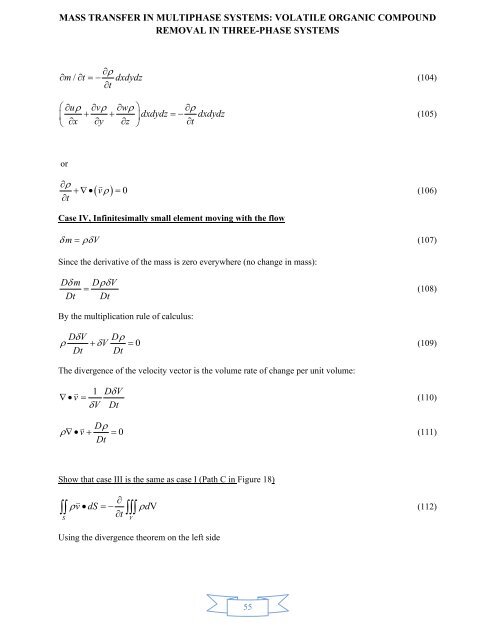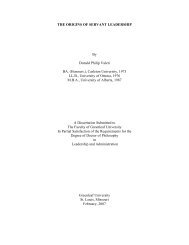mass transfer in multiphase systems - Greenleaf University
mass transfer in multiphase systems - Greenleaf University
mass transfer in multiphase systems - Greenleaf University
You also want an ePaper? Increase the reach of your titles
YUMPU automatically turns print PDFs into web optimized ePapers that Google loves.
MASS TRANSFER IN MULTIPHASE SYSTEMS: VOLATILE ORGANIC COMPOUND<br />
REMOVAL IN THREE-PHASE SYSTEMS<br />
<br />
m / t dxdydz<br />
(104)<br />
t<br />
u v w <br />
dxdydz dxdydz<br />
x y z t<br />
(105)<br />
or<br />
<br />
<br />
t<br />
v<br />
0<br />
(106)<br />
Case IV, Inf<strong>in</strong>itesimally small element mov<strong>in</strong>g with the flow<br />
m V<br />
(107)<br />
S<strong>in</strong>ce the derivative of the <strong>mass</strong> is zero everywhere (no change <strong>in</strong> <strong>mass</strong>):<br />
D<br />
m DV<br />
(108)<br />
Dt Dt<br />
By the multiplication rule of calculus:<br />
DV<br />
<br />
Dt<br />
D<br />
V<br />
0<br />
(109)<br />
Dt<br />
The divergence of the velocity vector is the volume rate of change per unit volume:<br />
1 DV<br />
v<br />
<br />
V<br />
Dt<br />
D<br />
v<br />
0<br />
Dt<br />
(110)<br />
(111)<br />
Show that case III is the same as case I (Path C <strong>in</strong> Figure 18)<br />
<br />
S<br />
<br />
vdS dV<br />
t<br />
<br />
V<br />
(112)<br />
Us<strong>in</strong>g the divergence theorem on the left side<br />
55



